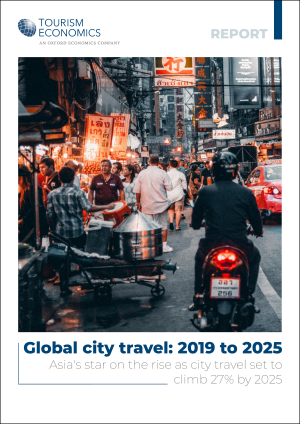Ungated Post | 21 Jun 2019
Global city travel: 2019 to 2025

Cities are a dynamic driver of global travel, both as destinations and as origin markets since cities house a greater concentration of people with high enough income to enjoy international travel.
630 million international visitors are expected in 2019 in the top 300 cities worldwide; an additional 28 million compared to 2018. These cities will account for almost 50% of global international visitor arrivals in 2019, while being home to just under 20% of the global population.
Large Asian cities are among the most visited, as the region houses seven out of the top ten city destinations. Bangkok, Hong Kong, and Macau are the three largest global destinations.
The top 25 destinations for international visitor arrivals in 2019 account for 19% of global visitor arrivals. These top cities contain a mix of established destinations as well as fast-growing destinations.
By 2025 an additional 173 million international travelers are expected to visit the top 300 cities around the world – an increase of 27% over 2019 volumes.
More than 300 leading companies, associations, and destinations work with Tourism Economics every year as a research partner. We bring decades of experience to every engagement to help our clients make better marketing, investment, and policy decisions.
To find out more about our capabilities, contact:
EMEA
Eva Satkute
+44 (0)203 910 8000
Email
Related Services

Post
The economic impact of abandoning the WTO
Oxford Economics have been commissioned by the International Chamber of Commerce (ICC) to provide an independent assessment of the economic impact of WTO dissolution. This report details our findings and the assumptions underpinning our analysis.
Find Out More
Post
The economic impact of the sports activities of public service media
This study shows how the sports activities of public service media supported €4.5 billion of GDP and 57,000 jobs across 31 European countries in 2022. The report also highlights wider economic benefits of public service media sports coverage, such as the way in which it leverages sponsorship income for sports bodies.
Find Out More
Post
Global Trade Education: The role of private philanthropy
Global trade can amplify economic development and poverty alleviation. Capable leaders are required to put in place enabling conditions for trade, but currently these skills are underprovided in developing countries. For philanthropists, investing in trade leadership talent through graduate-level scholarships is an opportunity to make meaningful contributions that can multiply and sustain global economic development.
Find Out More